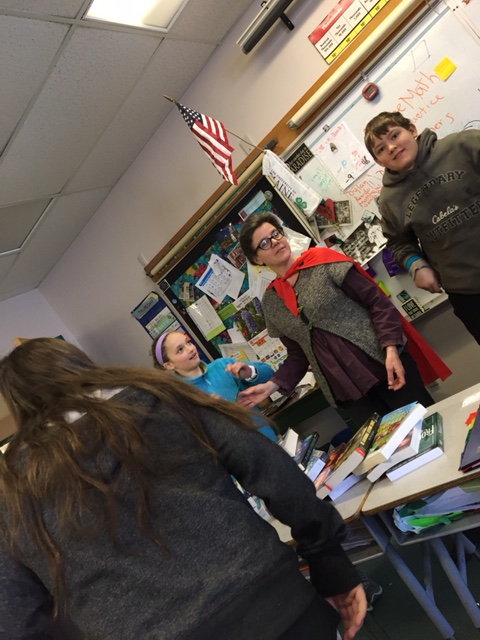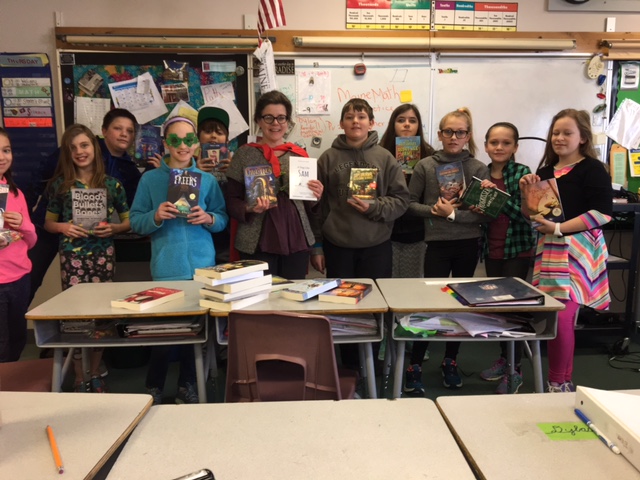One knows that the practice of treating reading like exercise, of encouraging the nation’s youth to read for 20 minutes a day, is an amiable deception. Its goal of course is to encourage reading gluttony, not light snacking, but is it a sound practice? To find out more, let us glean what we can from the Knute Rockne of 20-minute reading, my own assistant manager Karin Schott. With Karin’s son Evan immersed in that team sled reading competition, the IditaRead, at his local school, and with said team foundering, Karin stepped into the breach. Here she is.
 I know there is one kid in this class who reads a lot. His house is cluttered with books. There are at least three books at all time in the backseat of the car. He can’t help but read. His mom is a bookseller and librarian. And I am standing in front of his class with a box of advance reader copies of middle grade readers. He is trying not to die of embarrassment in front of his 20 classmates. I stand before them with a vague idea of what I will say. They are in fifth grade. They make the leap to middle school next year. Fifth grade is the last year they will participate in IditaRead, a month-long reading challenge that begins and ends in conjunction with the Iditarod sled dog race. Each student records the number of minutes they read each day. Each class works as a reading team to move their class across the finish line. The first class over the line wins a pizza party and has a plush husky dog in their classroom for the remainder of the school year. These kids have never won the race. Six years in this school and they have always trailed.
I know there is one kid in this class who reads a lot. His house is cluttered with books. There are at least three books at all time in the backseat of the car. He can’t help but read. His mom is a bookseller and librarian. And I am standing in front of his class with a box of advance reader copies of middle grade readers. He is trying not to die of embarrassment in front of his 20 classmates. I stand before them with a vague idea of what I will say. They are in fifth grade. They make the leap to middle school next year. Fifth grade is the last year they will participate in IditaRead, a month-long reading challenge that begins and ends in conjunction with the Iditarod sled dog race. Each student records the number of minutes they read each day. Each class works as a reading team to move their class across the finish line. The first class over the line wins a pizza party and has a plush husky dog in their classroom for the remainder of the school year. These kids have never won the race. Six years in this school and they have always trailed.
I can only suppose at the many reasons why. I know that some of these kids probably don’t have a steady stream of books coming into the home. They might order from the Scholastic book fair once or twice a school year with saved money. They might borrow books from the school library during the school year, but they don’t have access to the public library during the summer. When I was a kid the library was in walking distance. This is rural Maine, and some kids live whole towns away from a library. Some kids spend too much time in front of screened devices. Others have difficulty with the actual ability to read. In some homes reading is not as important as other things. Families are busy.
I try to give my best Knute Rockne speech about teamwork by sharing my own experience with having a lot to read. I am currently on the Indies Introduce panel for the American Booksellers Association. I have a stack of manuscripts and ARCs of middle grade and young adult novels to read for a list due out this summer and fall. I am reading a lot these days. These kids have to read at a minimum 20 minutes a day. If they save these 20 minutes till the end of the day it can seem daunting, especially if reading is not a habit. I think about what 20 minutes felt like at that age. When you are doing something you don’t want to do for 20 minutes it can feel like a slog as you watch the clock more that your page. Imagine if it is something that is difficult to do?
“Okay, team, we’re not going to let second graders out read us this year. This is your last year in this school – let’s go out with a reading BANG!”

And then I listed strategies they could use to reach their minimum of 20 minutes.
- I always carry a book with me. These kids walk around with giant backpacks on their backs. There must be room for a book in them. Keeping a book nearby assures success with the second strategy.
- Anytime I find I have to wait for something, like a doctor’s appointment or an after school program to let out, I pull my book out to read it. Five minutes here and there add up.
- I read to my son. We enjoy the experience of reading together. Shared reading with a parent, younger sibling, or childcare worker is considered part of the 20 minutes. I read aloud in the school library every morning. I invite them to join me.
- I suggested they read at their bus stops. Some of these kids are on the school bus for a long time. They could just read a page on the bus to and from school. They might find that they are in a really good spot and keep reading.
- Finally, I provided an incentive. I will return in two weeks with more books.
This last strategy seemed to light a spark. It is at this point I wonder if booksellers have superpowers. The class may try to read to the finish line. I hope they do. But if one kids finds a book that sparks a hunger for another or if one kid gives just a little more effort than in years past, I will consider this a success. I left my box of books for their teacher to distribute and left for work at the bookstore, my cape flapping in the cold March wind.
